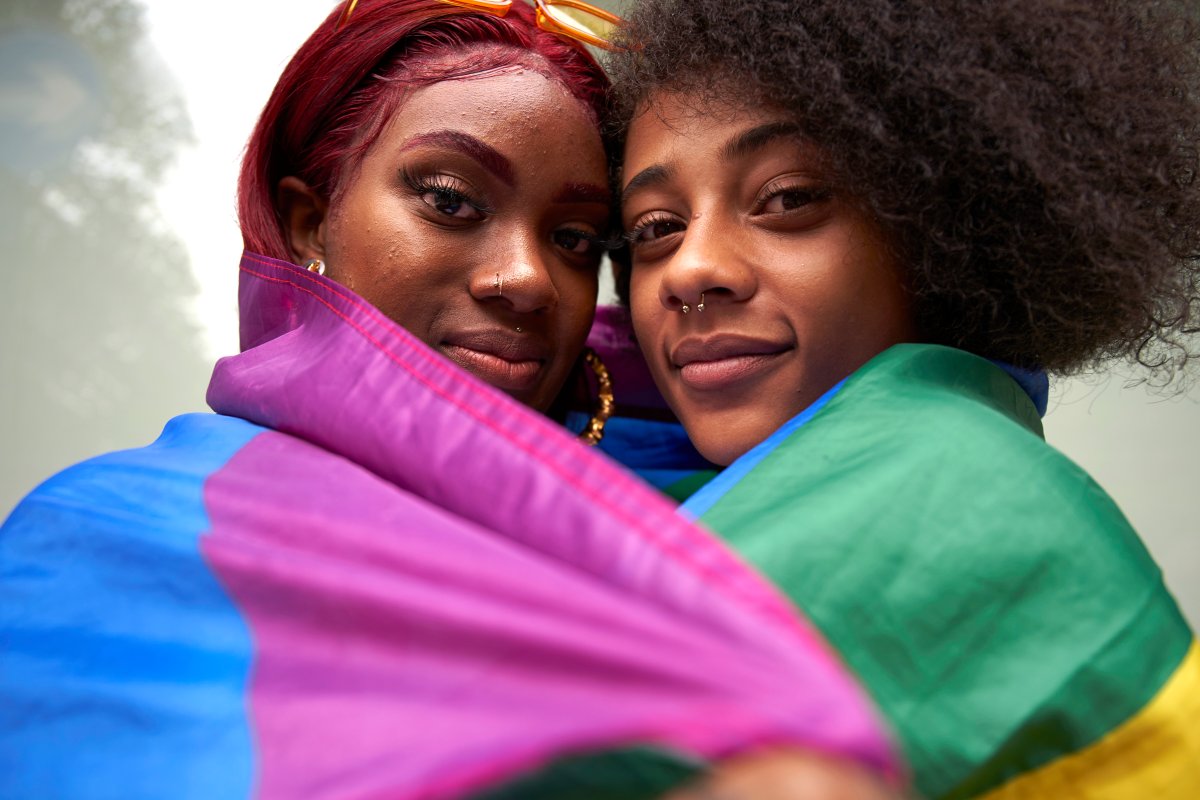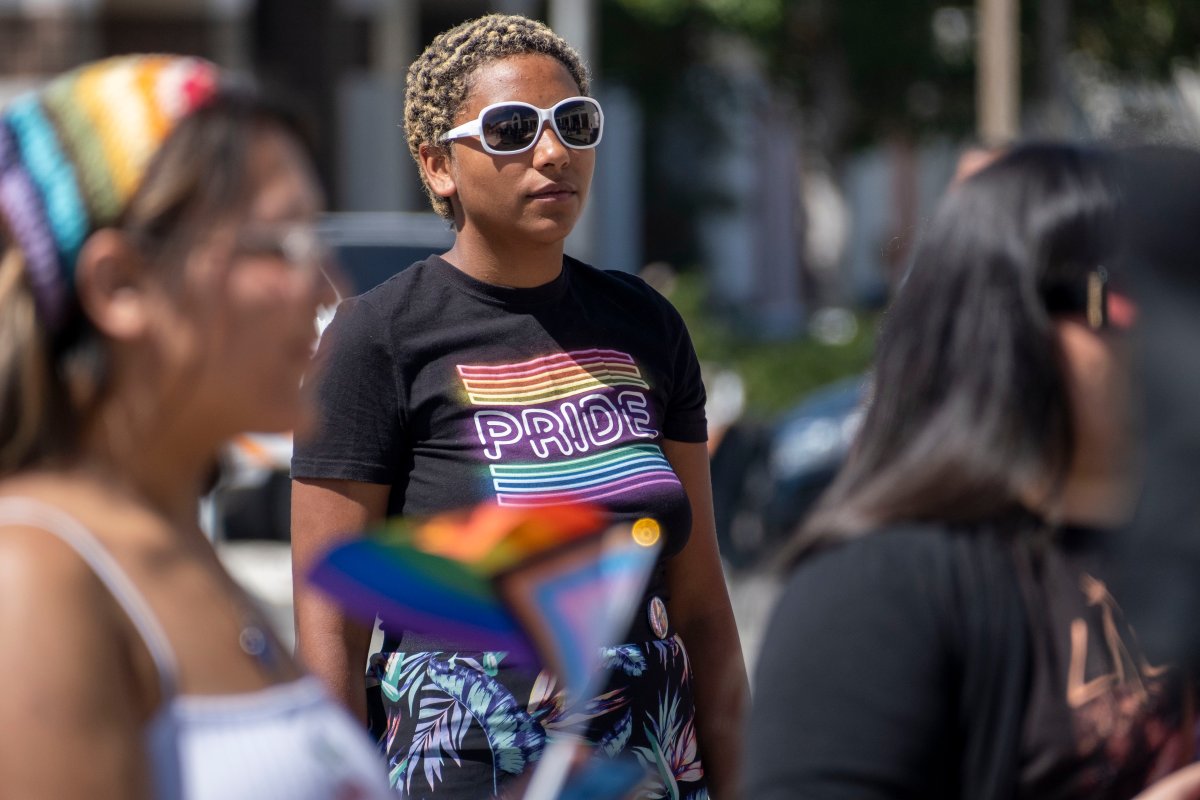Like so many, the COVID-19 pandemic forced Marci Warhaft to step back and evaluate her life.

While alone under lockdown in her Toronto apartment, Warhaft, 52, had to confront what was preventing her from feeling happy.
After 22 years of marriage to her husband, two children and a divorce in 2016, she knew exactly what it was: She was gay.
“I was basically coming out, in my apartment, to myself,” Warhaft laughed. “I always felt like I was this damaged puzzle piece. I was trying to fit myself into a puzzle and I felt that there was something wrong with me because I couldn’t make it fit.
“It took me until recently to realize that there was nothing wrong with me. I was just in the wrong puzzle.”
After that revelation, Warhaft came out publicly as a lesbian.
“There’s something that feels really, really, really good about knowing who you are, even if it takes a half a century,” she said.
Finding the right label
Still, even with this newfound personal acceptance, Warhaft worried about how, if at all, she would fit into the 2SLGBTQQIA+ community.
“There are some stereotypes (of lesbian people) that did make me question whether I should come out, but also whether I was actually gay,” she said.
In the lesbian community — and most other communities in existence, whether they’re race-based, orientation-based or really, anything-based — stereotypes are plentiful.
The stereotypes, Warhaft said, come from both inside and outside 2SLGBTQQIA+ circles.
Inside many lesbian communities, folks will often choose to identify with, or be told by others that they resemble, a specific “type” of lesbian. This can include the butch lesbian (stereotypically more masculine, has short hair, etc.), the femme lesbian (stereotypically more feminine, has long hair and “presents” as straight) and a melange of other labels.
These stereotypes can be incredibly restrictive, often pigeonholing the individual into a single label with rigid, must-have characteristics.
Unsure where she personally fit into the community, Warhaft felt these labels, and the perceived stereotypical requirements to claim one, were causing identity anxiety.
She said she felt if she didn’t meet all the stereotypical requirements for what it meant to be one “type” of lesbian, then she must not fit in at all.
“It’s one thing to call yourself a lesbian, but now I’ve got to know exactly what kind of lesbian,” she said.
Warhaft’s confusion about these labels was only heightened when she looked outward at other lesbians in her local community, many of whom felt great strength in claiming an archetype.
“There are some women who really, really feel empowered by their label,” Warhaft explained. “They own it and they’ve worked for it to be able to get the respect. But I also want to have the ability to not have to check all the boxes to call myself a certain thing.”
For this reason, Warhaft even wears a rainbow bracelet most days; a signal, she said, to let others in the 2SLGBTQQIA+ community know she is gay.
“I just am, who I am, who I am,” she said.
Owning a label
For other lesbians, there can be immense power in claiming a specific, albeit stereotypical, label.
Sar Wagman, who uses they/them pronouns, is a 23-year-old from Toronto. Though they originally came out as bisexual, for most of their adult life they have found intense empowerment in identifying as a butch lesbian.
“I honestly don’t think stereotypes are a bad thing. I think it has bad connotations,” Wagman explained.
“I love a good stereotype,” they joked. “I think it’s fun.”
The fun, Wagman said, is from creating close bonds with other butch or masc (masculine) lesbians. These other butch lesbians understand and recognize Wagman’s attachment to the label without the need to qualify whether every feature of their appearance and personality fits the stereotype precisely.
“We feel safe around each other,” they said. “I can be my true self.”
Wagman added that they believe stereotypes can be a beautiful, intimate thing when they are understood by the group they are about.
The problem, according to Wagman, is when people outside the given community only know the stereotypes, and not the real, visceral experiences of the people being stereotyped.
This can lead to false perceptions, confusion inside and outside of communities and a rigid belief that one must present exactly a certain way to belong and be accepted.
In Wagman’s case, just because their favourite colour is pink and they may have other more traditionally feminine qualities, doesn’t make them any less butch.
Like Warhaft, Wagman, too, is unapologetic about who they are.

The struggle to fit in
Even after her acknowledgement of in-community labels, Warhaft still had questions about whether she did (or should, for that matter) identify as gay.
Initially, upon coming out, Warhaft worried if other lesbians would accept her because of her past history with men.
There can sometimes be a belief that if a person is not a “gold star gay,” or rather, an individual who has never engaged in heterosexual relationships or sex, they are less-than.
Since she had been married and mostly participated in heterosexual experiences throughout her life, Warhaft worried other lesbians would be uninterested in her. She said because of this — in combination with her age — she was readily accepting that she may never find another partner.
To her surprise, as she came out and became more involved in queer circles, Warhaft said she realized instead that many women were accepting and encouraging, despite her history.
“The majority are very welcoming,” she said.
When stereotypes are harmful
Perhaps one of the most perpetuated stereotypes of lesbian people is one still commonly seen in pop culture and media today: that all lesbians must hate men.
For Warhaft, this was simply untrue, and she worried the people close to her would think she came out as gay for this reason.
“What bothers me about that is that it makes a woman’s sexuality about men,” she explained. “It’s possible to love women without disliking men. I’m not in this situation because I’ve had bad experiences with men. It’s because I realized that I had great experiences with women.”
She noted that many of her heterosexual female friends had problems with men — if not more often. Warhaft lamented the irony of it all.
“Women are not the consolation prize when it doesn’t work out with men,” she said.
More serious still, Warhaft cited one more stereotype that often made her worry for her physical safety.
Sometimes, Warhaft said, men will insist she is a lesbian just because she hasn’t had sex with the “right” man. This, an obvious result of the persisting societal fetishization of sapphic relationships, frightens Warhaft to the point where she often does not tell men she meets that she is gay.
“I don’t want somebody who thinks that I’m gay because I hate men, or I haven’t been with men, to want to force themselves on me,” she explained.
In Warhaft’s experience, if a man flirts with her in public, he usually does not relent when she tells him she is a lesbian. Instead, she claims some men will pursue her more aggressively, often becoming vulgar and intimidating.
“No disrespect to men, but I think men like to put themselves in every sexual scenario,” she said. “So I have to really gauge how I’m feeling with whether I am forthcoming with my sexuality.”
Wagman, too, said there were other, more harmful stereotypes that influenced their decision to come out as a lesbian.
Wagman was outed in high school. Having grown up in a highly religious, Pentecostal Christian environment, being outed — followed by critical reactions from their inner circle — felt catastrophic.
As a result, Wagman attempted suicide.
Wagman claimed people in her family and church community accused them of being a pedophile because of their sexuality.
“They accused me of the worst things possible,” they said.
Wagman claimed several members of their church community felt they would “pervert” children in the congregation.
Wagman is far from the only member of the 2SLGBTQQIA+ community to be met with such vulgar and volatile accusations. Still today, many among the staunch opposition to 2SLGBTQQIA+ acceptance continue to uphold this incorrect belief.
Stereotypes like this, Wagman said, are truly harmful, both to those in the 2SLGBTQQIA+ community and beyond. It’s yet another hurdle queer people have to overcome.
Why do stereotypes persist?
Ruth Neustifter, who uses they/them pronouns, is a registered family therapist and professor at the University of Guelph focused on teaching anti-oppression as it applies in different therapeutic contexts.
According to Neustifter, negative stereotypes of 2SLGBTQQIA+ people often exist, both inside and outside of queer circles, because of a persisting heteronormative, white culture in society. This results in what Neustifter calls “lateral violence.”
“The weight of oppression makes people bare their teeth at each other and fight over resources like respect that don’t need to be restricted,” Neustifter said.
“When groups are strapped for power or privilege, they step on each other’s faces to climb up the hill.”
For this reason, Neustifter said there’s a desire to emulate straightness and whiteness among underprivileged communities so as not to be seen as without power.
“I don’t think people even realize they’re doing it,” they said.
As a result of this emulation, many may not feel they are queer enough, butch enough, feminine enough, Black enough, or whatever else may be incorrectly perceived as needed to fit a certain label.
Instead, Neustifter said 2SLGBTQQIA+ circles should be a space where lateral violence need not occur.
“We’re so used to fighting to define ourselves, discover ourselves, explore ourselves and celebrate ourselves, why can’t we f—king do it holding hands, or at least at a respectful distance so that people can also have their own spaces?” Neustifter said.
What can we do now?
There’s no one simple way to remove negative stereotypes or labels in the 2SLGBTQQIA+ community, but Neustifter insists there are ways to start.
They said it is important to establish safer spaces for 2SLGBTQQIA+ folks — and not just spaces that cater primarily to cisgender, white gay men.
That’s why the work of people like Sarah Barnhart, who runs the event company Fruit Salad: Hamilton Edition, is so important.
The organization aims to respond to the lack of spaces for 2SLGBTQQIA+ women and gender-nonconforming folks.
Barnhart said as a Black, biracial queer woman, her identity has always floated somewhere in a grey area.
“I was still only seen as a hetero and, quite frankly, a white person,” Barnhart said. “That makes it hard to know where your place is. It also makes you invisible.”
Barnhart herself is no stranger to those “not enough” feelings Neustifter spoke about, and said that in the lesbian bars she had visited before — though lesbian-exclusive spaces are becoming harder and harder to find — she often felt out of place.
“If you don’t fit into what society has decided is the stereotype, then you aren’t welcome anywhere,” she said.
That’s why she started Fruit Salad: Hamilton Edition.
At Fruit Salad, Barnhart and her team host regular events in Hamilton. In May, they put on a Queer Prom event for “making our dress up, slow dance, queer dreams come true!” The Fruit Salad event was a safer space for an “adult re-do” of a high school prom.
All 2SLGBTQQIA+ women and gender-nonconforming folks are welcomed with open arms at Fruit Salad, regardless of labels and persisting stereotypes.
“I think that there is a stereotype of queer spaces — and especially lesbian spaces or lesbian-focused spaces — that it’s a utopia,” Neustifter said.
As of now, this is not the case. That’s why Neustifter is adamant organizations like Barnhart’s must be protected and supported.
Neustifter enthusiastically insists true allyship is not just about tolerance, but also action.
“Think of it as two different types of privilege: toxic privilege, and the kind of privilege that shouldn’t be a privilege. Everybody should just have it,” Neustifter said.
So the demand of real allyship, then, is to spread non-toxic privilege to others — what Neustifter noted is simply humanity and fair treatment — while also resisting and refusing the toxic privilege as you grow to realize you have more of it.
The only way to dispel harmful stereotypes and allow safer spaces for 2SLGBTQQIA+ people is this action, Neustifter said — action that must be taken by both those in the community and outside.
“It’s the responsibility of privilege to turn to privilege and say, ‘Do better.’ And that’s not a request. That’s an expectation,” they said.






Comments